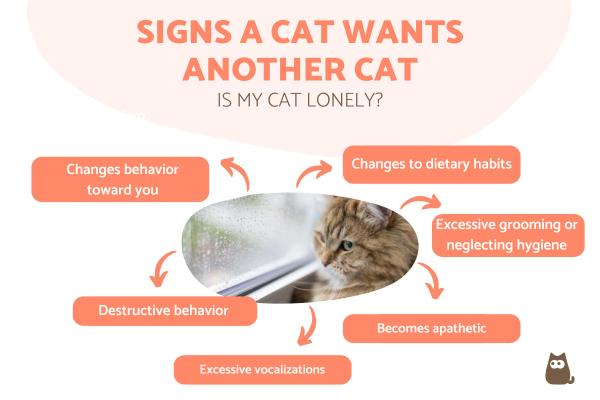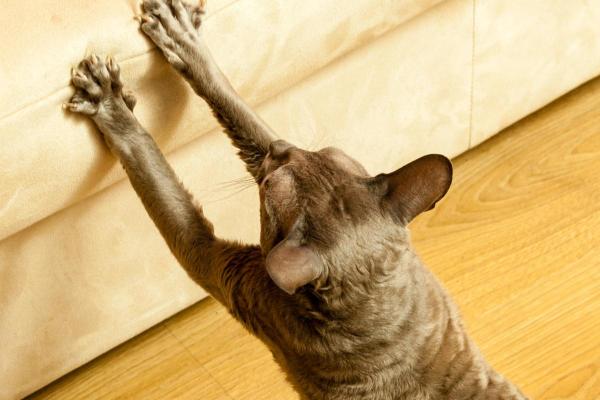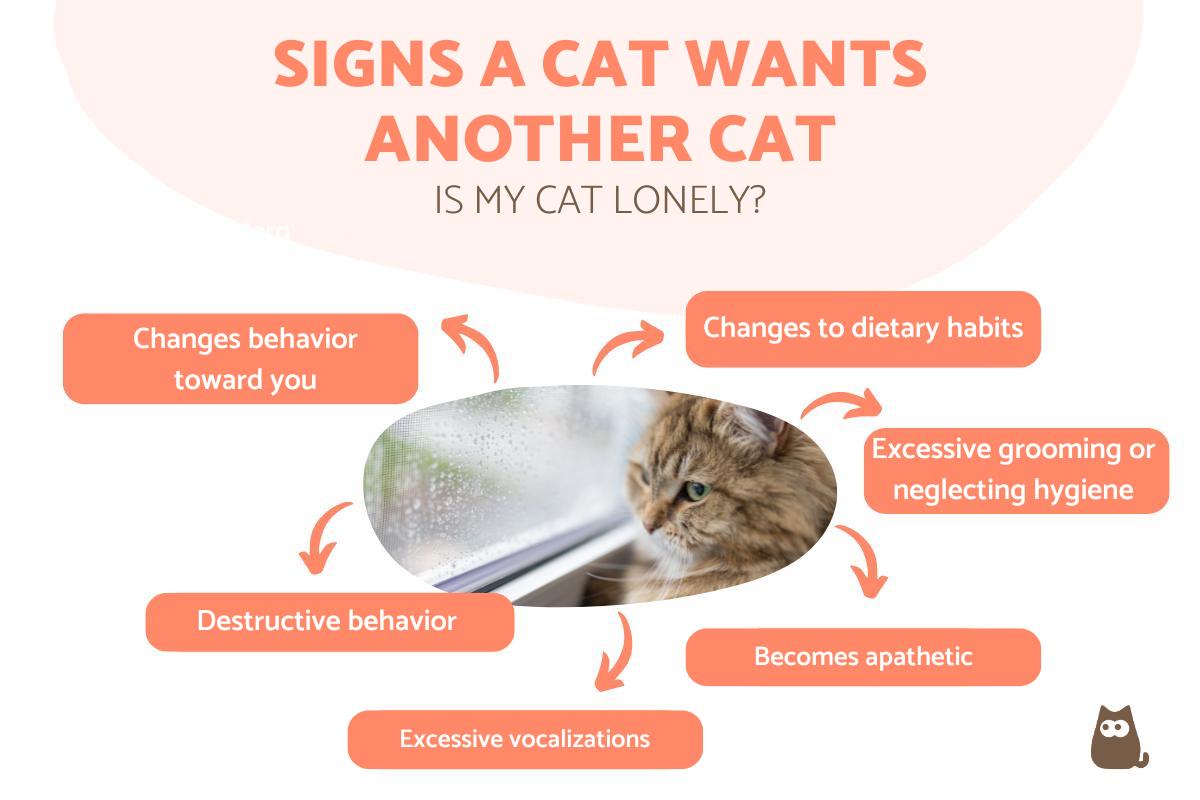Signs Your Cat Wants Another Cat



See files for Cats
When a cat changes their behavior towards you, becomes apathetic, meows constantly or changes their eating habits, it could be a sign they want another cat in the home. When a cat is lonely, they will express this desire for company in various ways. Intense loneliness can become so stressful that it leads to physical health problems, so it is important that we recognize these signs early and address them. Too many of us think of cats as solitary animals, but this is not the case. Despite varying levels of independence between individuals, felines are social animals that thrive in a group dynamic. Guardians cannot ignore this when providing care.
At AnimalWised, we look at 6 signs your cat wants another cat. We not only determine whether your cat is lonely, but look at the ways we can prevent such feelings of loneliness in the home.
Changing behavior toward you
When we first adopt a cat, it can take some time for them to adapt to their new environment. Once they have settled in and we have settled on a home dynamic, we should see them be consistent in their attitude towards us. This will vary according to the individual. Although this is somewhat dependent on biological factors, socialization, education and care are some of the most important influences on a cat's behavior.
Once the dynamic is settled, you will be better able to judge your cat's moods. If the cat was once affectionate, but now doesn't want to spend time with you, it could be a sign they are longing for company. Whether this is with you or another cat, it will still be a symptom of loneliness in cats. The cat may even become aggressive, lethargic, excitable or aloof. What's more important is the cat is showing signs they are unhappy and the reason for their unhappiness is being lonely.
Learn about how long it typically takes a cat to adjust to a new home in our related article.
They appear apathetic
The amount of hours a cat sleeps in a day is notoriously long. This can change depending on factors such as age, since young kittens and older cats both tend to sleep a long time. Despite this, it is not common for a healthy adult cat to spend all their time sleeping. If you observe your cat has been sleeping more than usual, it is possible there is a problem.
Sleeping too much is as bad as not sleeping enough. Cats should not be disengaged and inactive. It is very important for felines to explore, play and interact with others. Especially when they become apathetic towards things in which they once expressed great interest, it could be a sign of loneliness.
It is very important we know that apathy can also be a clinical sign of a physical health problem. Observing other signs of physical disease such as diarrhea, loss of appetite or excessive drooling means we need to take them to a veterinarian immediately. Watch the video below if you want to discover more generalized signs that your cat is sick.

Excessive vocalizations
Cats have a large repertoire of vocalizations, including different sounds manifesting in meows, hisses and purrs. Felines use these sounds to express their intentions and moods. It is a form of communication important between cats, but it is also something they us with humans. When a cat wants to communicate something with us, it is common for them to meow.
While it will depend on the cat, we often see them meowing when they want to eat, go outside or simply want our attention. This is normal behavior and some cats are more vocal than others. However, if a cat meows at us constantly, it means they want something from us. If a cat is lonely and meows all the time, it could be a sign they want another cat in the home.
Excessive meowing in cats can also due to many other reasons. It is important to look at the context of this behavior to determine the impetus. For example, if we have guests in the home, their litter is dirty or we have changed their food, they could be meowing to tell us they are not happy with these new arrangements. This is common since cats are creatures of habits and often don't well tolerate changes to their routine.
Changes to their dietary habits
Although not as gregarious as some, the domestic feline is considered a social animal. In the wild and when feral, they will establish contact with other cats. When in a home environment as a companion animal, they need regular contact with their humans for optimal well-being. When this does not happen, it is very common for them to become stressed. Changes to dietary habits is a common sign that a cat is stressed.
Some cats are more anxious than others and even relatively benign stimuli can result in an episode of anxiety. Unfortunately, it can be difficult to determine when a cat is stressed since there is no uniformity among individuals. Some cats may start eating a lot less because they are on edge and lose their appetite. Others might eat a lot more because they are bored or simply want to experience a positive experience during times of negativity.
Cats with a greater tendency towards anxious behavior may begin to eat impulsively, becoming suspicious and demanding. This symptom is known as hyperphagia and usually indicates that there is some problem in the animal, especially if it has appeared suddenly. It suggests there is either an emotional or a physical problem.
Cats that express loneliness by becoming apathetic may eat less. In addition the cat may start trying to hide all the time or sleep for prolonged periods. When they stop eating a cat will become malnourished. Even if the cause is emotional, the problem will become physical and will need veterinary intervention.
Excessive grooming or not grooming at all
A cat's coat is an indicator of their overall health and well-being. Their fur should be lustrous and thick, although there will be some variance depending on the cat's genetic heritage. Cats will groom themselves both to stay clean and to maintain balanced character. Licking their fur helps them to stay calm and provides comfort. It is for this reason, a cat will lick other cats and even ourselves when they have a close bond with them.
When a cat grooms excessively, it means there is a problem. Physical health problems can cause this behavior. Cats are good at hiding symptoms of pain, but they will manifest themselves eventually. If the cat keeps licking themselves, they may be doing so to feel better. The same can occur with emotional pain. When the cat is stressed, anxious or bored, excessive grooming can be employed to help them feel better emotionally.
A lack of grooming is also very problematic. Similar to a cat not wanting to eat or interact with their guardians, cats will neglect their coat when they are apathetic. This could be due to weakness from a physical ailment, but it is also common when they are understimulated in the home.
When a cat engages in excessive grooming, they can lick their skin to such an extent their fur falls out and wounds develop on the skin. Both overgrooming and neglecting their hygiene are serious problems which need to be addressed.

Destructive behaviors
Cats need sufficient stimulation for happiness and well-being. Some cats need more stimulation than others, but no cat will thrive when enduring neglect. Destructive behaviors in cats are common when a cat is not receiving enough physical or emotional stimulation, something which can be indicating the cat wants another cat in the home.
A happy and healthy feline will often knock over objects or cause some destruction. These are expressions of their curious and playful natures. It will not necessarily mean they are lonely or a sign they want to live with another cat. Only when the destructiveness is performed in an anxious way is it a sign of a problem. It is an expression of frustration and can be a response to many environmental issues.
Destructive behaviors are particularly common in indoor cats that do not have any outdoor access. If they are stuck alone at home for a long time, they will not receive the interaction they need to be level. If we spend a lot of time away from the home, it is not uncommon to see the cat has destroyed furniture, knocked over items or generally caused havoc in the home.

What should I do if my cat feels lonely?
If a cat is lonely, it is often the case that we will think about adopting another cat into the home. Not every cat is the same. Some cats do not play well with others and adopting a new cat can worsen existing behaviors rather than improving them. For this reason, it is very important we look at the above signs a cat wants another cat in context. Since they can also be indicators of very different problems, we should do the following:
- Go to the veterinary center: it is important to have the cat examined by a veterinary professional to rule out potential physical health problems. Not doing so can result in the problem worsening, something adding another cat to the home is unlikely to solve.
- Dedicate more time to them: when a cat is lonely, we may assume they want another cat. However, it could simply be that it is our company they seek. Adopting a cat comes with responsibility. We need to ensure we meet this responsibility by playing with them, responding to their calls and providing affection.
- Enrich their environment: environmental enrichment for cats is a very important factor in their well-being, especially when we are not around. Providing toys, intelligence games and places to explore will help a cat to express their feline instinct in a healthy way. Different cats will have different needs when it comes to stimulation.
- Use synthetic pheromones: cats emit a variety of pheromones to communicate with other felines and establish their territory or safe zones. If your cat feels lonely and sad, the use of appeasing pheromones can help improve their well-being. It is important to clarify that pheromones will not be the solution, but it can be a complementary treatment.
- Consider adopting a second cat: when we have insured there is no physical health problem and have made the above modifications, it may be that a cat still feels lonely. In some cases, bringing a new cat into the home can help provide the animal with the companionship they need. However, doing so is a process and bringing a cat home incorrectly can cause more problems.
Learn how to best avoid these problems with our article on how to introduce a new cat to another cat.
If you want to read similar articles to Signs Your Cat Wants Another Cat, we recommend you visit our Basic care category.







